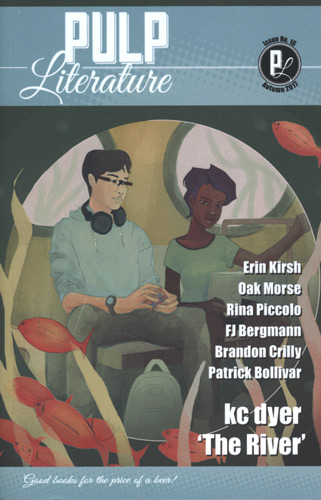PULP Literature – Autumn 2017
I absolutely loved the August 2017 issue of PULP Literature! If the quality of the short stories within this issue is any indication of the overall quality of the publication, then I cannot wait to pick up the next issues! PULP Literature contains everything I love in short stories and novellas from my favorite genres of fiction: science fiction, fantasy, mystery, history, thriller, and chiller.
I absolutely loved the August 2017 issue of PULP Literature! If the quality of the short stories within this issue is any indication of the overall quality of the publication, then I cannot wait to pick up the next issues! PULP Literature contains everything I love in short stories and novellas from my favorite genres of fiction: science fiction, fantasy, mystery, history, thriller, and chiller.
An instant favorite of mine was “The Olde Town Haunt” by Patrick Bollivar. In this haunting story, Bollivar recounts an evening in the life of a medium named Charlotte, her mother, and her ghost baby brother. Her mother has been lured away by the voices of the ghosts during the night and she is forced to go find her mother. Charlotte ends up at an old building where the spirits of the dead gather to dance, drink, and linger. She finds that her mother has been lured by the power of a very bad spirit who is drinking the souls of the living and dead. This was a great, creepy story that kept me riveted from beginning to end.
Another favorite was Mel Anastasiou’s “Stella Ryman and The Ghost at the End of the Bed,” the eighth Stella themed novella. Mel Anastasiou writes for a number of mystery publications and has created illustrated workbooks on story structure. In this story, we follow Stella Ryman in a retirement home as she tries to puzzle out the mystery of items that have gone missing within the home, including her own painting. She can’t sleep and keeps seeing a ghost at the end of her bed, leaving her confused and uncomfortable. Not only is this a good mystery story, it also gives a dark but intelligent look at what happens to the elderly when they are no longer capable of caring for themselves and are placed in the care of others.
This issue also contains “The River” by established author kc dyer. “The River” takes on a unique perspective as the narrator tries to figure out where the river is and who these people are that he encounters along the riverbanks. As he walks along with an old man, he questions the old man, trying to puzzle out the river and the other people he encounters. Eventually, the old man explains that all he knows “is those who remain here do so until they are forgotten by all they left behind.” I found myself trying to puzzle out the river too, and coming to realize we cannot just try to “disappear” and let ourselves be forgotten in the world. We need to make an impact and to live our lives honestly and with greater intent, or we also can end up lost.
Rina Piccolo presents a short graphic story “The Vanishing Dot,” which follows a person reminiscing about old television sets and the vanishing dot that used to remain on the old screens, even when the television was off. She connects this dot to the greater cosmos in an amazing way. She shares that “Radiation—light—from the creation of the universe, the beginning of time, is reaching us . . . through wooden TV sets that smell of lemon scented Pledge[.]” This bit of science, this connection to the creation of the universe as we know it, changes the narrator’s perspective of old television sets, giving them a grander meaning that I think we can all appreciate.
One more story that really piqued my interest was “Think Tank” by Susan Pieters. The story seems to be about an older mother watching her daughter’s husband disappear into his job, isolating himself from his wife and child. He misses his child’s birth, doesn’t care about his pregnant wife moving in with her mother, and grows more and more distant over the course of the story. What we don’t know about his job, and the connection of that job to a greater purpose, is what creates such an interesting twist at the end of this story.
As an avid fan of science fiction, mysteries, ghost stories, and visions of a dystopic future, PULP Literature was right up my alley. This publication does not limit itself to one genre or format, but instead focuses on exceptional talent and breakout works that challenge both the reader and the writer. Each piece was truly unique, building worlds that we don’t expect or telling stories that keep readers wanting more.
[www.pulpliterature.com]





